A Washington House amendment could dissolve the decades-old, bi-state commission that manages the Columbia River Gorge

Breaking news: Some lawmakers in Washington want to end a cooperative agreement to fund management of the Columbia River Gorge National Scenic Area. Photo: USFS
UPDATE: On April 26, 2025, the Washington State House and Senate agreed to fund the Gorge Commission for the 2025–27 biennium. The $1.6 million appropriation cut the Commission’s funding by 27%. —Editor
By Nathan Gilles. April 24, 2025. On April 1, lawmakers in the Washington State House of Representatives passed a budget proposal that included an amendment that would eliminate the state’s funding for the bi-state commission responsible for regulating land development inside the Columbia River Gorge National Scenic Area.
The Columbia River Gorge Commission is jointly funded and operated by Oregon and Washington.
The amendment, which was introduced days earlier during a House Appropriations Committee meeting, seeks to remove Washington’s contribution of around $2.4 million from the state’s proposed 2025-2027 biennium budget.
A separate budget proposal passed by the Washington Senate proposes funding the commission for the next two years.
The Gorge Commission oversees the implementation of the national scenic area’s land management plan, which regulates development of non-federal lands that fall inside the 83-mile-long scenic area.
Sources interviewed for this story say removing Washington’s funding for the Gorge Commission would likely eliminate the bi-state commission and its regulatory oversight over the land management plan, making the future of the scenic area uncertain.
With the commission gone, the responsibility for implementing the land management plan would fall to the Washington and Oregon counties within the scenic area.
While county residents and representatives have expressed concerns that the land management plan has limited their tax bases by limiting development, eliminating the Gorge Commission is unlikely to lead to a wave of new building and new revenue. Instead, it’s more likely to lead to costly litigation.
That’s because the federal law that created the scenic area and its land management plan won’t go away.
What will go away if the commission vanishes is the Gorge Commission’s appeals process, which has allowed conservation groups and counties alike to avoid lengthy legal battles.
Should the commission disappear, counties aren’t the only ones likely to get sued. Defunding the commission could also open the State of Washington to lawsuits from not only conservationist organizations but also the State of Oregon.
How one state defunding the commission could end it
The Columbia River Gorge National Scenic Area was created in November 1986, when
President Ronald Reagan signed the Columbia River Gorge National Scenic Area Act into law.
The scenic area runs along both sides of the Columbia River, from the wet, outer edge of the Portland-Vancouver metropolitan area in the west to the drier regions of Wasco and Klickitat counties in the east.
Many lawmakers don’t know what the Commission is, even confusing it with a music venue with a similar name.
The act mandates the preservation and enhancement of the Gorge’s “scenic, cultural, recreation, and natural resources …”
To ensure this, the federal legislation empowered Oregon and Washington to jointly manage the scenic area with the U.S. Forest Service through an agreement called the Columbia River Gorge Compact.
In essence a contract between the states, the compact was created via two separate pieces of legislation by Oregon and Washington lawmakers. This legislation created the Columbia Gorge Commission and requires that funding for the commission “shall be apportioned equally between the states.”
In practice this has meant matching down rather than up. This is how the current Washington House effort to defund the commission could lead to its end.
An analog to what’s happening now occurred in 1997 when Washington approved funding that reduced the commission’s budget by almost three-quarters.
The compact’s equal funding clause was interpreted to mean that Oregon had to match Washington’s reduced funding, rather than the other way around. This matching-down-rather-than-up interpretation occurred in other years as well.
That Washington defunding the commission would lead Oregon to follow suit has local conservationists concerned.
It’s also a concern of the State of Washington’s Office of Financial Management.
In a letter dated April 4, 2025, written to members of the House Appropriations Committee, OFM Director K.D. Chapman-See outlined her office’s concerns.

K.D. Chapman-See. Photo: Wash. Office of Financial Management
“Without funding from Washington, [the Columbia River Gorge Commission] would be unable to continue to operate,” wrote Chapman-See. The letter recommends continued funding for the agency.
The letter also appears to suggest that should Washington lawmakers completely defund the commission that would equal breaking the bi-state compact, which can only be ended through legislation.
“If the Legislature decides that the [Gorge] Commission is no longer of value, it would need to withdraw from the compact by repealing Chapter 43.97 RCW [the Washington law signing the state onto the compact],” wrote Chapman-See.
Breaking a bi-state contract
What Chapman-See’s letter hints at is that while “matching down” has been the norm, zero funding is, according to the bi-state compact, too low.
Both the Washington and Oregon legislation creating the Gorge Commission require both states to provide “funding necessary” for the Commission to perform its duties.
Rick Masters, a lawyer specializing in state compact law and coauthor of a book on compact law published by the American Bar Association, says the bi-state compact “clearly obligates” both Washington and Oregon to provide funding for the commission.
“The compact itself has explicit language or express language that requires funding by both states,” says Masters. “Defunding [the Commission] would be a violation of the compact and would be a breach of contract that could be the basis of a lawsuit.”
Deciding not to fund the commission, says Masters, could open the state of Washington to potential lawsuits by both third-party beneficiaries, including citizen and conservation organizations that benefit from the scenic area, and potentially even the State of Oregon. Though Masters says he thought the latter unlikely.
Echoing Chapman-See’s letter, Masters says the legally appropriate way for Washington to end its contract with Oregon is through official legislation.
This is also the position of Krystyna Wolniakowski, executive director of the Columbia River Gorge Commission.
“Any change to the way that the two states will be funding the Gorge Commission has to be done in agreement,” says Wolniakowski. “You do that through legislation. You don’t do that through a budget amendment.”
Wolniakowski says she has been meeting with Washington lawmakers to make the case for funding her agency.
Without the commission, who writes the management plan?
Wolniakowski says even if Washington were to eliminate the commission by defunding it, the legal responsibility to oversee the national scenic area and implement the land management plan wouldn’t go away.
Instead, the obligation would fall to other government entities that cooperate in the scenic area, key among them the counties.
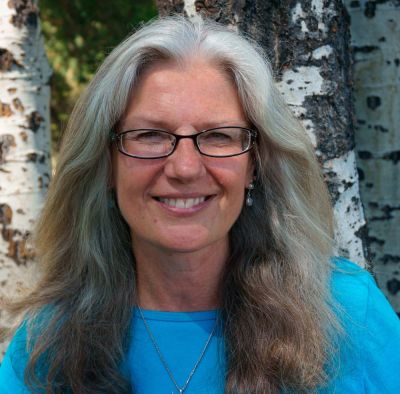
Krystyna Wolniakowski. Photo: Columbia River Gorge Commission
Currently six counties fall under the scenic area’s land management plan: Multnomah, Hood River and Wasco counties on the Oregon side, and Clark, Skamania and Klickitat counties on the Washington side.
Five of the six counties have incorporated the Commission’s land management plan into their own land use planning. The Commission currently oversees the implementation of the plan in Klickitat County.
Wolniakowski says the counties have done a “great job” implementing and incorporating the management plan, describing her agency as providing oversight and helping the counties to make sure they are “working on permitting in a consistent way and interpreting consistently.”
However, she says she worries this could unravel if the commission were to disappear. She’s particularly worried about the upcoming update to the management plan, which her agency currently oversees.
“Would the counties [update the plan] on a county-by-county basis and then decide which [rules] they like and which ones they don’t?” says Wolniakowski. “If they want to adopt something that may not necessarily be consistent with the management plan and they go ahead and do it, there’s no one to really oversee and monitor that.”
The act that created the scenic area requires an updated land management plan every 10 years. Wolniakowski says the new update will begin July 2027.
No commission, more litigation
Without the commission there would be groups monitoring the implementation of the plan, including conservation organizations.
However, without the commission to play peacemaker, these entities would be more likely to sue.
The commission has an appeals process that allows concerned parties to challenge development projects approved by the counties.
The primary group participating in the appeals process is the conservation watchdog Friends of the Columbia Gorge.
“We already comment on every development application that’s submitted in the scenic area, which allows us to then enter into any appeal if one is prompted or required,” says Renée Tkach, conservation director at Friends of the Columbia Gorge. “If the Gorge Commission went away, I would foresee more appeals and conflict within the litigation world, which would end up costing these counties more in the long range.”
Friends of the Columbia Gorge has been lobbying lawmakers in Olympia to keep the commission funded.
County development and taxes
The possibility of more litigation also concerns Asa Leckie, commissioner for Skamania County’s District 3. Though he says concerns that the counties would no longer follow the rules without the commission are unfounded.
“If the Gorge Commission were to go away all of a sudden, we’re not going to just go buck wild on development because that just invites a whole mess of litigation,” says Leckie. “We not only don’t want to deal with that. It would be breaking the law.”
Of the 293,000 acres (over 457 square miles) that fall inside the scenic area, roughly 70% is privately owned. The remaining 30% consists of federal lands. This creates conflict.
Critics of the national scenic area have long argued that the rules it imposes on the counties within its jurisdiction have stifled much-needed development in the Gorge, including new accommodations for tourists, commercial development and new housing for Gorge residents. Leckie says he has heard these concerns from his constituents.
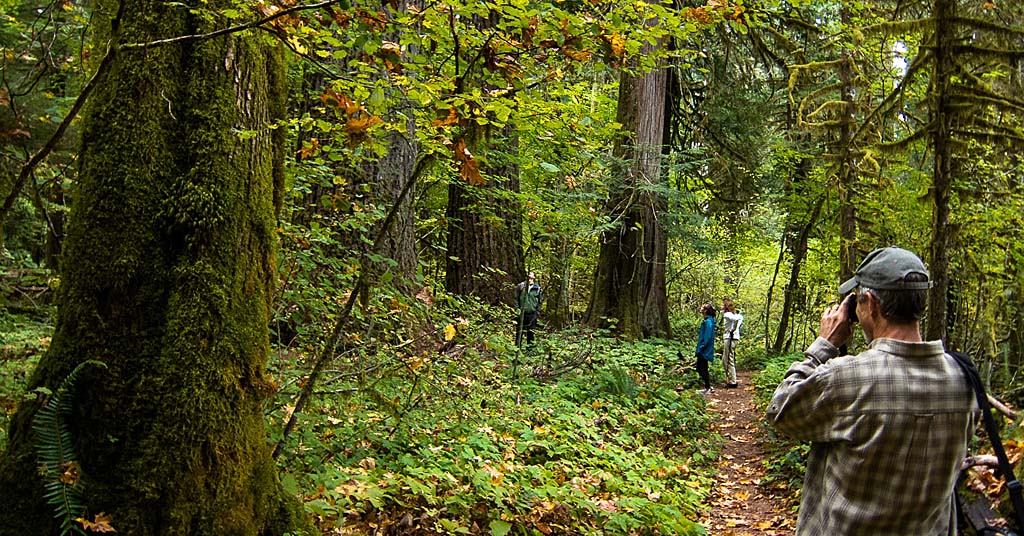
Money still not growing on trees: Most of Skamania County looks like this un-taxable scene at Cedar Flats in the Gifford Pinchot National Forest. Photo: Jurgen Hess
Restricting development also limits the amount of property the county can tax to fund itself.
“Most counties have a property tax base that can provide the services they need,” says Leckie. “There’s only 2% of developable land left in Skamania County right now. That’s it.”
In the absence of property taxes, Leckie says Skamania County has come to depend on revenue from timber harvests, which he says has been less reliable, and federal funding, including the Secure Rural Schools program. The SRS program provides funding for 4,400 rural schools located in counties with federally owned land. The U.S. House failed to reauthorize the program in December 2024.
“We voice concerns, then we’re turned into the villain,” says Leckie. “We’re not the villain. We’re advocating for our constituents and their concerns. Our school district is losing SRS [Secure Rural Schools]. It’s now short close to $2 million. I mean, how does a small school district recover from that?”
Leckie says while some of his constituents support defunding the commission, he does not.
He says Skamania County has expressed its concerns to Washington lawmakers, but rather than requesting the commission be defunded, it requested funds equal to the Gorge Commission to help fund the county.
Who is behind the amendment?
So, who is behind the move to defund the Gorge Commission? Nobody from the Gorge, apparently.
The current Washington amendment to defund the commission was introduced on March 27 during a House Appropriations Committee meeting by Rep. Travis Couture. The Republican lawmaker represents Washington’s 35th District in the Puget Sound area.
The Amendment was seconded by Rep. Steve Tharinger. The Democratic lawmaker represents the 24th legislative district of northwest Washington, including the Olympic Peninsula and the town of Aberdeen.

Rep. Travis Couture. Photo: Legislative Support Services
Couture told the committee when introducing the amendment that defunding the commission was one of many hard decisions they needed to make to balance the state’s budget.
“I think those hard decisions come in this amendment where we have to eliminate funding for the Columbia River Gorge Commission,” said Couture.
Rep. Couture’s office declined Columbia Insight’s request for an interview with the representative.
“We agree,” Tharinger told the committee, seconding the amendment. “I think this not just for the savings, but I think it is a good indication that this might have run its course and having some indication that there might be a better way to approach some of the issues there.”
An email sent to Tharinger’s staff requesting clarification on the lawmaker’s remarks went unanswered.
In an April 9 interview with Gorge Radio, Republican Rep. Kevin Waters, who represents Washington’s 17th District, which includes parts of Clark, Skamania and Klickitat Counties, said he thought the reason the commission was defunded was because many Washington lawmakers didn’t know what it was and had even confused it with a Washington music venue with a similar name.
“I mean, I had four or five members come up to me and say, why the hell do we have a commission for a concert venue? And I said, we don’t. It’s a totally different gorge,” said Waters.
Despite this, Waters said he thought the commission would in the end get funded.
An email to Waters requesting an interview went unanswered.
Washington lawmakers have until the end of the current legislative session on April 27 to reconcile the differences in their funding proposals, which must then be signed into law by Gov. Bob Ferguson.

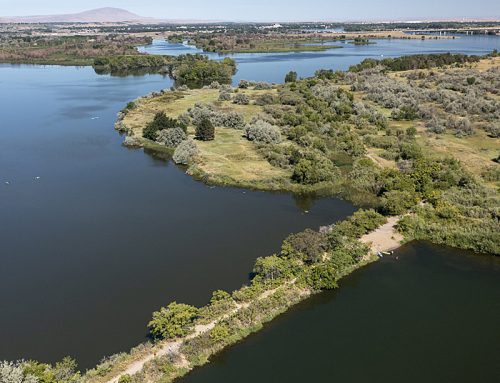
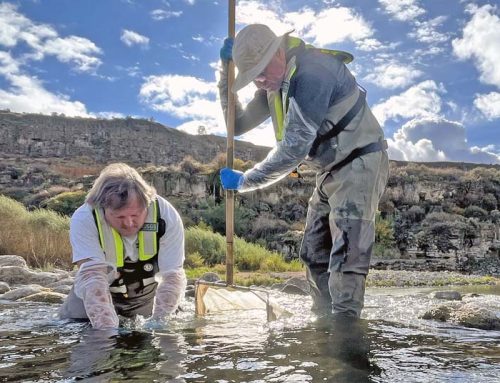

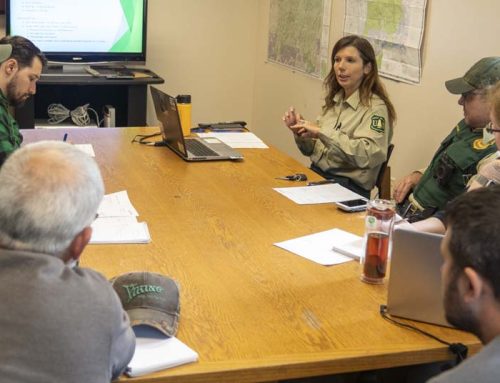

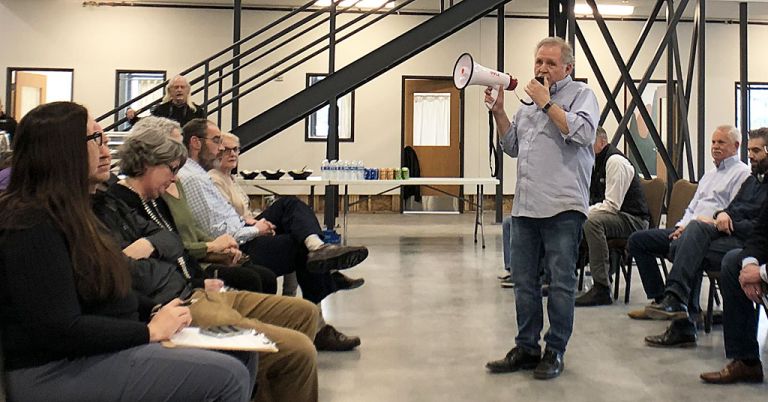



As a native Portlander now living in Bellingham, WA, I remain passionate about protecting the Columbia River Gorge from development! This scenic area is far too valuable in its mostly natural state than any amount of development would produce. Contrary to the thinking of some people (like the sponsor of this bill, apparently), making money from the landscape is not the best use of the land. Leave the current beauty for our descendants to enjoy!
The area in question has, to use the time-worn phrase, already “been there and done that.”
There is no reason that so called economic development schemes will even work, they didn’t when they were tried before.
Google AI shows: The Historic Columbia River Highway is a scenic 70-mile route in the Columbia River Gorge of Oregon, designed to showcase the region’s natural beauty. Built between 1913 and 1922, it was one of the earliest scenic highways in the US and is now a National Historic Landmark.
One hundred years ago folks put their money into economic development promised by the Highway. There are remnants of those days decayed into time. There are always folks who think they can get other people to spend their money on them.
The Gorge is a tough place for lots of reasons. Folks who would try to develop it should be careful what they wish for, they might get it. That mountain home might just be 10 years into a 30 year contract a mountain of debt, private and public.
He proposed potential ruin one of one most spectacular places on the planet to save 0.0063% of the WA state budget in one cycle. That is not visionary leadership. And no, Gorge Amphitheater is not the Columbia River Gorge, dude.
To have developers come into the gorge to build resorts, hotels, air bnb’s and everything else imaginable would destroy the beauty of the gorge and choke out the people that already call it home. As it is, the tourism has become a problem to navigate through just to get to work and do everyday errands. The amount of trash on the sides of the road has tripled and adds to the degradtion of the beauty. I think people need to buy a gorge entrance pass to come in and visit and then that money get dispersed out to the six counties to clean up the trash and for road upkeep and fire prevention.